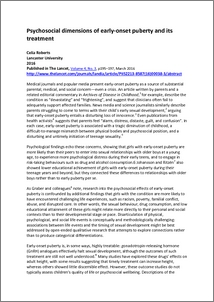Psychosocial dimensions of early-onset puberty and its treatment
Roberts, Celia Mary
(2016)
Psychosocial dimensions of early-onset puberty and its treatment.
The Lancet Diabetes and Endocrinology, 4 (3).
pp. 195-197.
ISSN 2213-8595
![[thumbnail of Psychosocial dimensions of early puberty]](https://eprints.lancs.ac.uk/78022/4.hassmallThumbnailVersion/Psychosocial_dimensions_of_early_puberty.pdf)

Preview
PDF (Psychosocial dimensions of early puberty)
Psychosocial_dimensions_of_early_puberty.pdf
- Accepted Version
Available under License Creative Commons Attribution-NonCommercial-NoDerivs.
Download (107kB)
Abstract
Medical journals and popular media present early-onset puberty as a source of substantial parental, medical, and social concern—even a crisis. An article written by parents and a related editorial commentary in Archives of Disease in Childhood,1 for example, describe the condition as “devastating” and “frightening”, and suggest that clinicians often fail to adequately support affected families. News media and science journalists similarly describe parents struggling to come to terms with their child's early sexual development,2 arguing that early-onset puberty entails a disturbing loss of innocence.
Item Type:
Journal Article
Journal or Publication Title:
The Lancet Diabetes and Endocrinology
Additional Information:
This is the author’s version of a work that was accepted for publication in The Lancet Diabetes and Endocrinology. Changes resulting from the publishing process, such as peer review, editing, corrections, structural formatting, and other quality control mechanisms may not be reflected in this document. Changes may have been made to this work since it was submitted for publication. A definitive version was subsequently published in The Lancet Diabetes and Endocrinology, 4, 3, 2016 DOI: 10.1016/S2213-8587(16)00038-3
Uncontrolled Keywords:
/dk/atira/pure/subjectarea/asjc/1300/1310
Subjects:
?? endocrinologyendocrinology, diabetes and metabolisminternal medicine ??
Deposited On:
28 Jan 2016 10:30
Last Modified:
11 Dec 2025 01:08